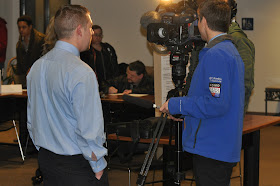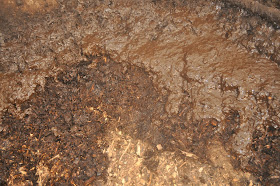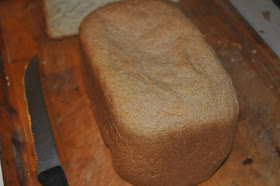With the purchase of the new farm in escrow, Jeff asks a question I've been thinking about a lot:
 |
| She's due in July |
"So are you going to milk cows or just grow your pig operation? "
Tempted
It's actually pretty attractive to me to use at least part of the infrastructure for what it was designed to do. I could, if I decided to, go buy a milking herd and be in the dairy business in a month or two. What attracts me to that is that it's pretty much a turnkey operation. What scares me about that idea is that the last guy who did it went broke.
I talked a lot about it in
this post, and I actually had this farm in mind when I was talking about it, but that was while we were negotiating about prices, and I wasn't sure that I was going to get it into the price range I wanted to pay. I worried a lot about prices because land is probably the most expensive single thing you'll buy while you are farming, and you limit your choices (and ability to weather downturns) when you have a lot of debt. A key thing for this purchase was getting it at a price that made sense -- hopefully at less than it will be worth in a few years, and I think I've done that.
Life is good the way it is
So the simplest option is to do nothing on the farm -- pigs don't mind the dairy infrastructure, they just appreciate the roof and the shelter. Fill it with wood chips, use it as is, no change. The pig business will basically pay for the property.
Seems a waste not to use good ground
But I only need about 10 acres of the 70 for the pig part of the venture -- and pigs can use a lot of the land that's marginal -- you don't need prime cropland for pigs. Brushy overgrown areas, forested areas, all work pretty well for pig areas.
Low input farming
What i am considering is a grass fed dairy, and that's why I was over
in the milking parlor in December. I wanted to get a feel for the work, and the issues, and how the barn was set up and so on. I'm grateful that the farmer was willing to let me see his operation because it made it a lot less scary to contemplate. He's milking 120 cows, and has a husband-and-wife team who are relief milkers for him, and is a pretty good model for what I've been thinking about.
My biggest fear
My biggest reservation about operating a dairy is that I am really, really, uneasy about how milk is sold.
I'll expand on that a little: If I don't like the price that a local butcher will pay for pigs, I have a relatively easy time finding a customer to buy my pig. If all else fails, I can go to the auction and sell the pigs -- probably for less than what I want, but I can sell them. Pigs are relatively liquid assets and I have a number of choices about how I'd like to sell them. If I can't sell them this week, since I've got
low-cost feed it doesn't cost me much to keep them until next week, or even months, if I need to.
Milk is different. A dairy produces a lot of milk; thousands of gallons, and if you don't sell it relatively quickly, it rots. Dairy cooperatives work by pooling the production of many farmers, and the milk truck comes to your farm to pick up the milk. That's the good thing.
The bad thing is that the price you get for your milk is basically assigned to you. And if you don't like the price, you can choose not to sell it, but that's really not an option. And you have no ability to sell the milk to anyone else, usually, because of the cooperatives contract. if you're selling to dairygold, you cannot have your own private brand. Same for Organic Pastures, same for horizon, to name three cooperatives in my area.
You're married to your dairy co-op
So you have a highly perishable product that takes a lot of time and money to produce, and you have absolutely no control over the price you get for it and realistically, when you're a member of a coop, you have no choice about who you sell to.
Food prices are variable, and I
fundamentally distrust the food market. I think that food prices are manipulated by external forces and that fact hits a dairy on both ends -- the cost of feed for your dairy is also affected. So both your input prices and production prices are subject to market forces that you have no control over.
A ray of hope
But every once in a while there's a little ray of hope, and what appears to be a path to profitable dairy farming. Here's what I think it looks like:
Your dairy only runs as many cows as it can produce food for. if you are producing your own forage you have much more control over the cost of that feed, and by doing so you have a big cost under control.
You own your own land outright, or have as low a cost of land as you can possibly get. In my case, the total payment on this property is about $1400 a month, plus utilities; I got there by a combination of a big down payment and very favorable interest rates right now. Lots of people pay $1400 a month as rent in the Seattle area. You want your fixed costs as low as you can possibly get -- this becomes your "retreat" number -- if things don't go well, an off-farm job could pay that mortgage pretty handily.
And finally, you figure out a market that isn't a dairy cooperative. If you want to see what I mean, take a look at
this video.
Take home lessons from that dairy:
Organic certification - higher retail price
Small herd - they're milking 30-50 cows
Bottles their own product, sells direct to consumer, and to a local market chain
*NOT* a member of a coop -- has the flexibility to find other markets for their milk.
Gets a higher percentage of the retail dollars returned to the farm.
Their milk is selling for $10/gallon. ($115/cwt) That same milk sold to a coop would be $1.87/gallon ($23/cwt). Every dollar counts to the farm.
So that's where I am. The waste-not part of me would like to use the infrastructure. The engineer part of me says that it could work. The business manager part of me wants to see a few more farms and get some more experience before committing.
So my plans are this point are to close the deal as quickly as I can, hopefully before the growing season starts, and plant those corn fields with grass and some experimental plots. I'd like to see if alfalfa can grow out there. I'll probably plant some corn, a few acres of it, and some other things, and I'll keep thinking about the dairy. I'm certain that I will have a personal milk cow; the question is whether I'll buy another 60 cows to keep her company.
I haven't decided.



















































